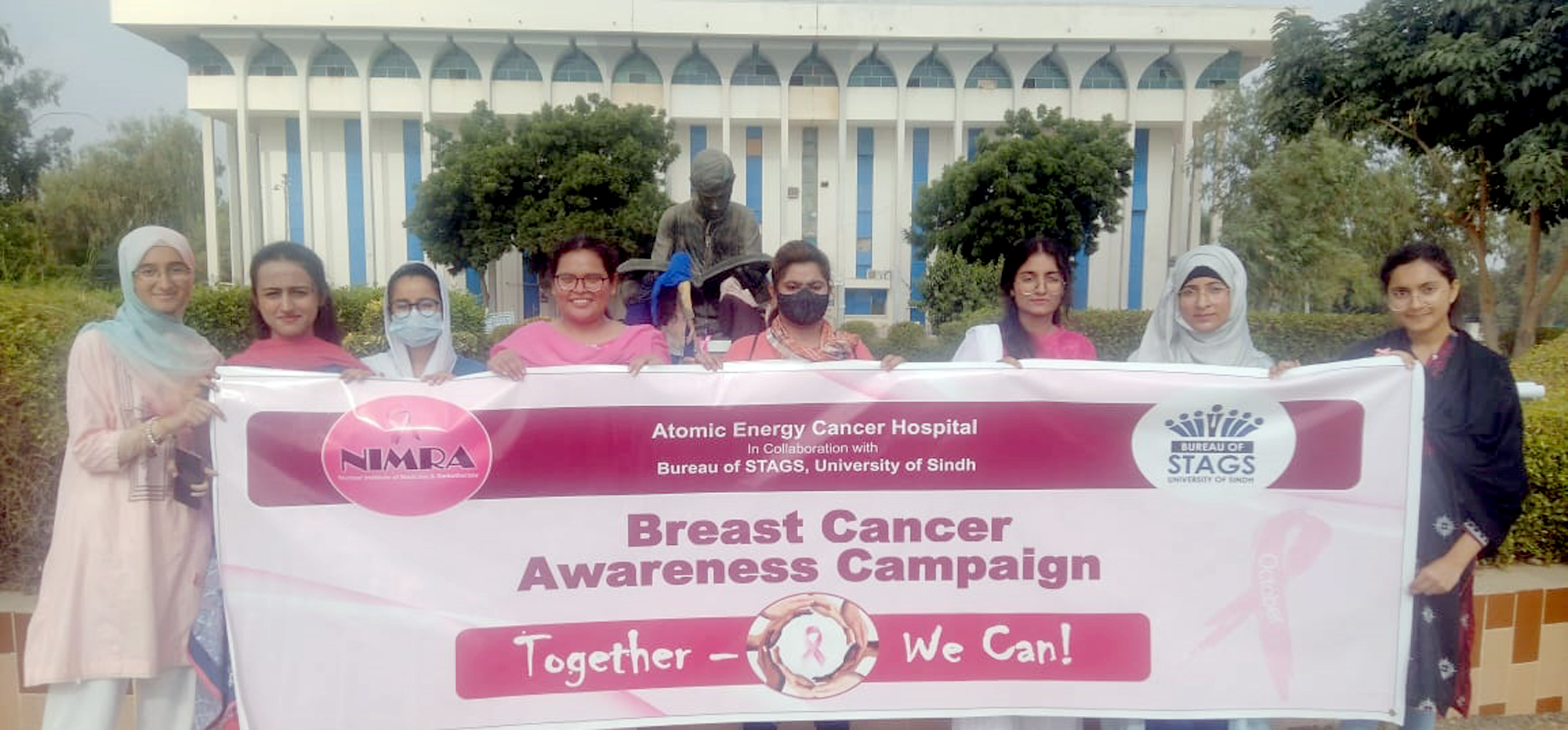
Diagnosis of breast cancer at an early stage termed effective step in reducing morbidity and mortality
Sindh University’s Bureau of Students, Tutorial Guidance/ Counseling Services & Co-Curricular Activities (STAGS) organized an awareness walk regarding breast cancer here on Thursday.
Led by the Director Bureau of STAGS Professor Dr. Ghazala Panhwar, Deputy Director Dr. Mubarak Ali Lashari, Director Nimra Cancer Hospital Dr. Syed Shahid Iqbal, Consultant Oncology Nimra Cancer Hospital Dr. Naseema Munir and Radiation Oncologist Dr. Amina Sulaiman, the rally was taken out from Zero Point to Arts Faculty Building by the Bureau of STAGS in collaboration with Nimra Cancer Hospital Jamshoro in a bid to raise awareness about breast cancer, wherein a number of teachers and male as well female students participated.
Students who participated in the walk were carrying banners and placards in their hands stressing on the youth to take precautionary measures to protect them from the lethal breast cancer.
After reaching the Arts Faculty Building, the participants rushed to the Department of International Relations to participate in a wakefulness seminar organized in its Nelson Mandela Hall.
Addressing the seminar, Director Nimra Cancer Hospital Dr. Syed Shahid Iqbal said that the awareness campaign against breast cancer should be made public at the national level. Pamphlets and information materials should be distributed so that both male and female could get proper knowledge about the fatal disease.
He said that due to ignorance about the prevalence of breast cancer in men, the diagnosis of the disease was delayed and the ailment strengthened its hold in the human body and led it to fatality.
He said that because of lack of awareness in Pakistan, 89% of patients were diagnosed after and 59% of the patients were diagnosed before the condition worsened.
Consultant oncologist at Nimra Cancer Hospital Jamshoro Dr Naseema Munir said that breast cancer was a curable disease and if it was diagnosed in time, there was an effective treatment available for it.
She said that Nimra Cancer Hospital Jamshoro had facilities for initial screening of patients, disease diagnosis, biopsy, ultrasound and mammography, adding that the expenses incurred on the said tests were affordable even for a common man.
She said that breast cancer was increasing both in women as well as in men; consequently, she said men should also consult a physician immediately if they felt any abnormal movement in the body.
She said that cancer was usually a hereditary disease, if someone in one's family suffered from the disease, they should undergo related tests at different times in order to detect the disease if it took place, adding that detection of breast cancer in time was the only effective weapon against it.
Oncologist Radiation Nimra Hospital Dr. Amna Suleman said that every year 90 thousand women were diagnosed with breast cancer and the death rate from the disease was high only because the illness was not detected in time.
She said that there was an urgent need to break cultural and traditional barriers in the prevention and treatment of breast cancer.
Speaking on the occasion, Director Bureau of STAGS Dr. Ghazala Panhwar said that there was concern over further spread of breast cancer in the region including Pakistan due to a plethora of reasons.
She said that modern demographic trends indicated that the number of cancer patients will increase further.
She said that diagnosis of breast cancer at an early stage was always significantly effective in reducing both morbidity and mortality.
Dr. Mubarak Ali Lashari said that mammographic screening was associated with different social, cultural and economic groups, but women in Pakistan approached the doctor in the last stage of cancer due to many social, economic and cultural boundaries.
He said that patient's age, employment status, lack of awareness, fear of surgery and belief in traditional and spiritual treatment were the root causes and dangerous trends.


